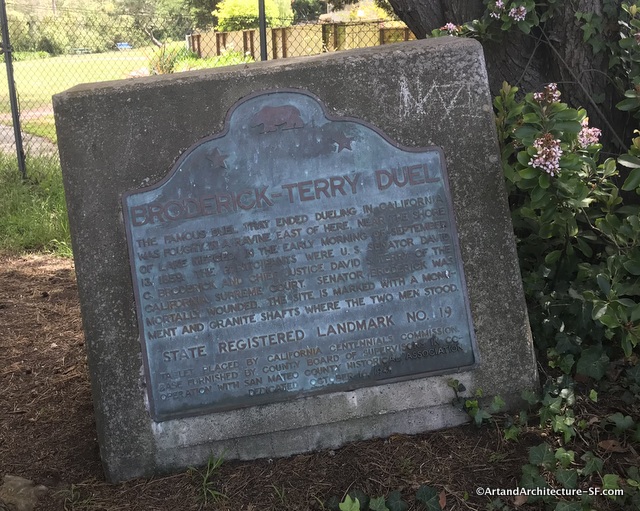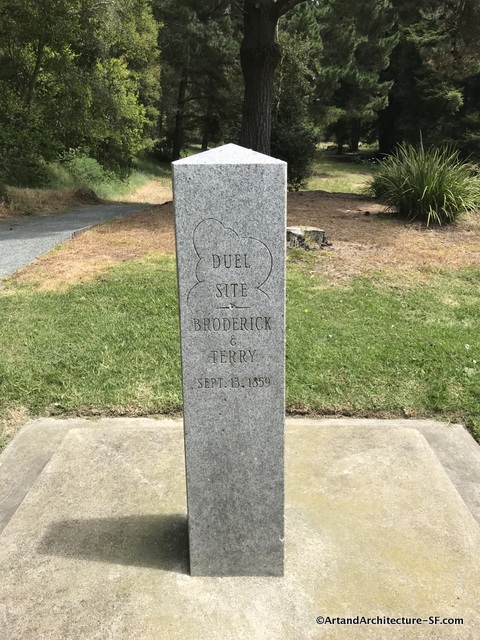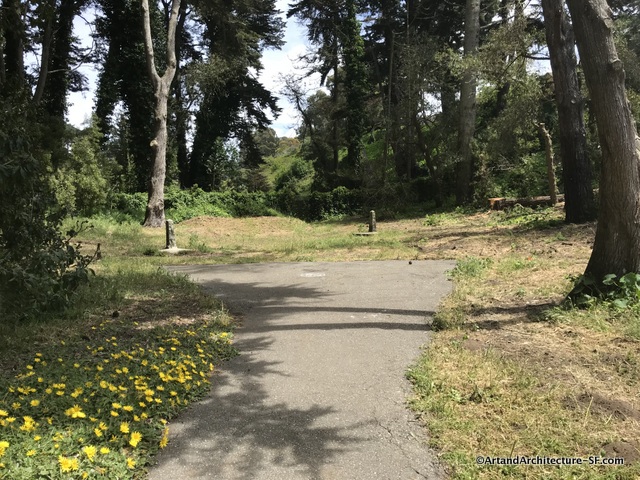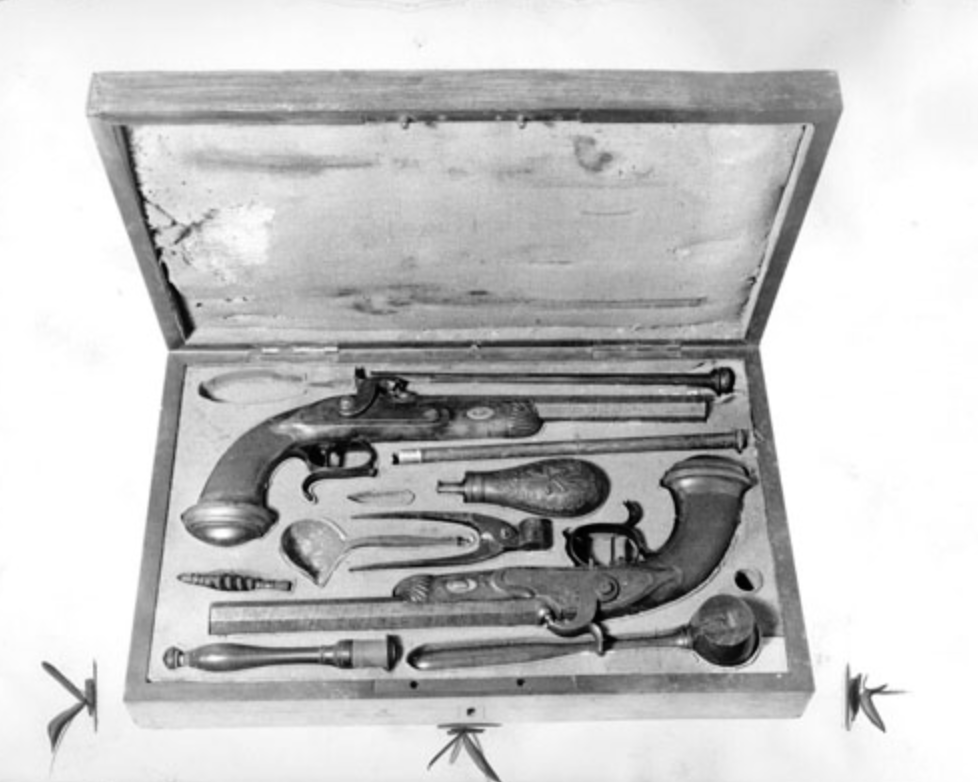The site is in an unamed park
Off of Lake Merced Boulevard
Access is available off of El Portal Way near number 79
Daly City just South of the San Francisco City Limits

On June 1, 1932, the site of the Broderick Terry Duel was registered as a California Historical Landmark, and in 1949, marker 19 was erected at the beginning of the trail that leads to the site.
Just after the discovery of gold the State of California found that its citizens were as divided as the rest of the nation in regards to slavery.
California was home to people from the North—often referred to as free-soilers—who were against slavery, and Southerners who supported slavery and called themselves the Chivs (for chivalry).
California entered the United States as a free-state, however, its vague antislavery constitution was open for extensive interpretation.
This intense division led to a duel amongst friends on a September day in 1859.

A second marker stands inside the small park
David Colbreth Broderick was born in 1820, the son of an Irish stone cutter. In 1846, after an unsuccessful run for a seat in the U.S. House of Representatives, he moved to California’s to seek his fortune. After achieving successes in minting and real estate, he became a member of the California State Senate from 1850 -1851. In 1857, he was elected as a Democrat to the United State Senate at a time when the Democratic Party of California was sharply split in two, between the pro-slavery group and the “Free-Soil” advocates. Broderick was staunchly opposed to the expansion of slavery and worked to support the anti-slavery movement.

The two granite slabs mark the site where each man alledgedly stood were placed here in 1948.
David S. Terry was a Chief Justice of the California State Supreme Court and an advocate of extending slavery into California. Having previously stabbed a political member in 1856, Terry was man known for his hot temper and tendency toward violence.
Although Terry and Broderick had been friends, when Terry lost his re-election because of his views on pro-slavery, he blamed David Broderick for his loss. At a party convention in Sacramento in 1859, Terry gave a speech, attacking Broderick and his antislavery stance. Broderick responded to Terry with an equally unflattering statement and as tempers flared, Terry challenged Broderick to a duel.
At the time of Terry’s challenge, duels were illegal in San Francisco. They had originally scheduled the duel for a few days before September 13, but there was too large a group of witnesses and the duel was shut down by the city police.
On September 13, they secretly moved the duel located to Lake Merced, just outside of the city limits.

The pistols used in the duel. Photo courtesy of SFPL History Center
The chosen weapons were two Belgian .58 caliber pistols. Broderick was unfamiliar with this type of gun, while Terry, had spent the previous days practicing with this gun.
Even before the final “one-two-three” count, Broderick’s gun misfired into the dirt. He then stood facing Terry who aimed at his chest and fired, the bullet entered Broderick’s chest and lung. The wounded Broderick was rushed to a friends home but despite the doctor’s best efforts, he died three days later, reportedly saying “They killed me because I am opposed to the extension of slavery and a corrupt administration.”
The San Francisco duel drew national attention. Senator Broderick’s death turned him into a martyr for the anti-slavery movement.
Terry was accused of assassination.
Captain of Detectives I. W. Lees and Detective H. H. Ellis went to Terry’s home to serve out a warrant against him. Ellis described the arrest: “Lees and I procured a warrant against Terry and had it properly endorsed. We then proceeded to Terry’s home. When we arrived within about one hundred feet of the house, a window was thrown open and Calhoun Benham, Tom Hayes, Sheriff O’Neill and Terry leveled shotguns at us and told us to ‘halt.’We did so and announced that we were officers with a warrant for Terry. He stated that he was certain that he would not receive a fair trial and feared violence at that time, but agreed to surrender three days afterward in Oakland. Knowing that he would keep his word in this, as we also knew he would do when he told us that if we came nearer to his house they would all shoot, we decided to allow him to dictate terms. He surrendered as per agreement, and the case was heard by Judge James Hardy in Marin County, a change of venue having been granted because of the alleged prejudice against Terry in San Francisco. This case was dismissed but Terry was subsequently indicted by the Grand Jury in San Mateo County. The point was then raised that he had been once in jeopardy, and being well taken, that case was also dismissed.”
Senator Broderick’s San Francisco funeral was attended by thousands of mourners and Senator Edward Dickinson Baker (for whom Fort Baker in Sausalito is named) gave the eulogy. The City of San Francisco erected a large monument in Laurel Hill Cemetery and named a downtown street “Broderick Street” in his honor.
In 1937, with the closing of cemeteries in San Francisco Laurel Hill burials were relocated to Cypress Lawn Memorial Park in the town of Colma, just south of San Francisco. The vast majority of the bodies from Laurel Hills were moved to mass gravesites, and anyone wanting to have decedents privately reburied had to pay for it themselves. Laurel Hill’s site is located in Cypress Lawn Cemetery, and called Laurel Hill Mound.
In 1942 Broderick was reinterred at Cypress Lawn Memorial Park in one of the mass burials, there is no grave marker for the Senator.